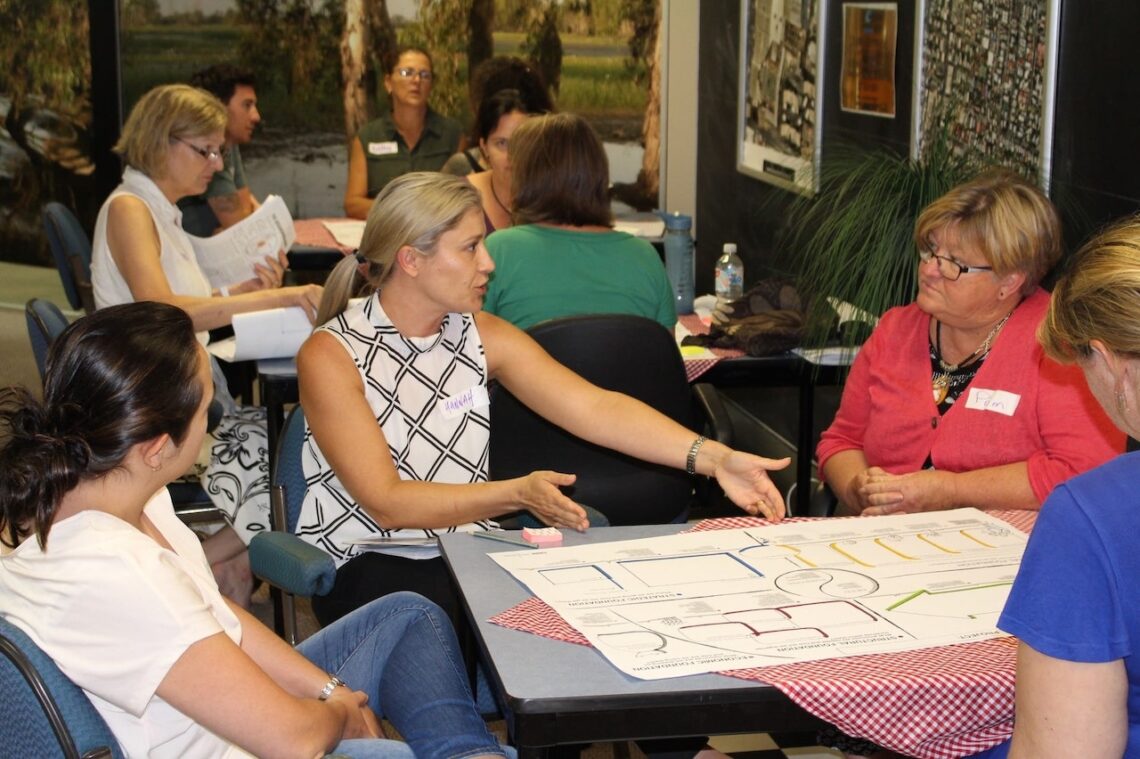Inspiration
Groundwork and The Nature of Organising – An Introduction
Queen Margrethe II of Denmark is quoted as postulating, “What if all the wars and conflict in the world are the result of conversations that never happened?”
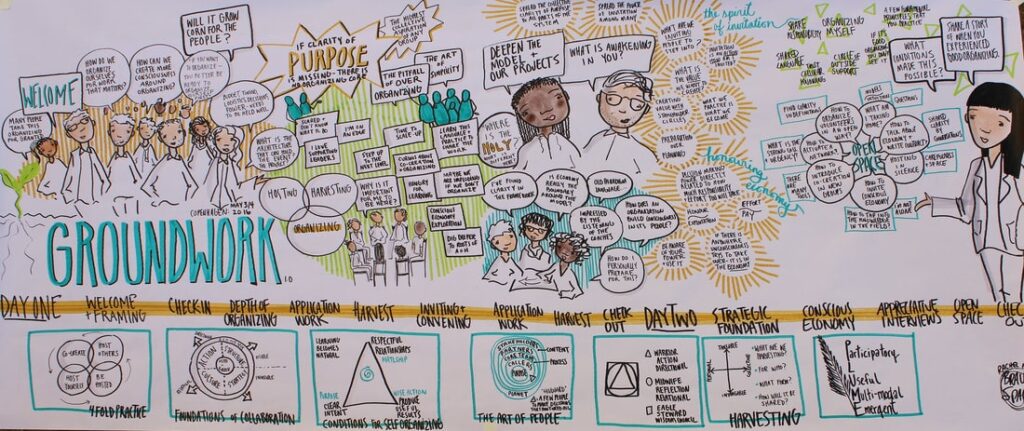
Visual by Bravespace
There is no doubt that most conflicts would be averted if the parties involved could enter into conversation with a mutual desire to listen, understand and acknowledge the needs of the other, and to collaborate in finding a mutually agreeable solution. In reality however, many conversations are not so simple, even when there is a mutual desire to engage.
What often allows us to successfully engage in conversation or collaboration, is that certain conditions are in place. These conditions, and the practice of cultivating them, are the subject of this guide. We call the practice Groundwork.
The Need for Collaboration
Collaboration, or at least the idea of collaboration, is enjoying something of a renaissance these days. There is definitely some truth to the comparison of collaboration to teenage sex: “Everyone is talking about it. Everyone thinks everyone else is doing it. Those who are doing it aren’t doing it very well. Yet despite that, everyone talks about how good it feels.”
The reality is, the practice of working together as humans is incredibly powerful, and will always be much more than a popular concept. Collaborating is an art that requires commitment and practice. It is only by being in this practice that one truly learns what collaboration is all about.
Collaboration is essential for life. And as our understanding of this reality grows, so does our interest in what it takes to collaborate. At the same time, a tangible climate of fear and scarcity is manifesting in Western society as a push for separation. In response to this, many of us are asking ourselves: What are we collaborating for? Who are we prepared to collaborate with? What are we prepared to compromise on in order to achieve a common goal?
One thing is for sure. If we want to address the social, economic and environmental crises that are part of our reality today, we are long past the time for just thinking or talking about collaboration. We no longer have time to wait for others to make the first move. It is time to practice leadership by inviting each other together around what matters to us. The future of life as we know it will be determined by our ability to collaborate.
“Collaboration is vital to sustain what we call profound or really deep change, because without it, organisations are just overwhelmed by the forces of the status quo.”
Peter SengeQuality of Collaboration
Effective collaboration can be broadly measured according to whether or not you achieve that which you set out to achieve. For one reason or another, effective collaboration tends to be the exception, not the norm. There is no doubt that working with others brings challenges that don’t exist when working alone: needing to accommodate worldviews or perspectives that differ from our own; working and learning styles that conflict with ours; an inability to hear or understand what others are really saying.
When it comes to collaborating around really complex challenges the problem is not a lack of technical expertise. Most of us simply don’t have the organisational skills and capacities, the so-called “soft skills” required to co-create successful, long-term solutions. Fortunately, these capacities can be learned and developed through practice. The key point is that effective collaboration doesn’t need to be difficult or painful. Indeed, it is entirely possible to co-create a collaborative process which not only fulfills the purpose, but which also becomes a generative and life-affirming experience where everyone involved benefits from the collaborative process itself. We call it Powerful Collaboration, and our goal is to create a culture where collaborating in this way is the norm.
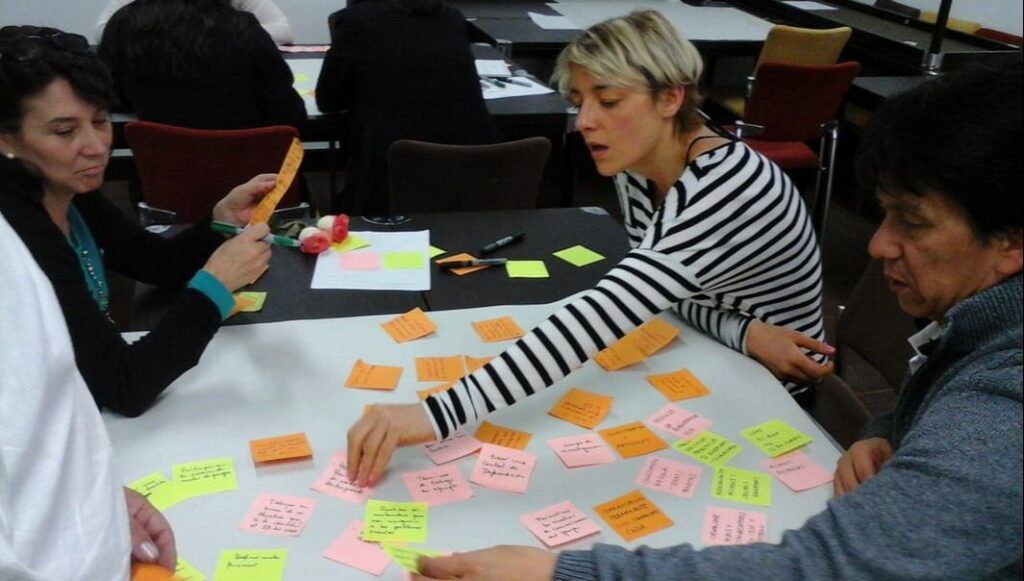
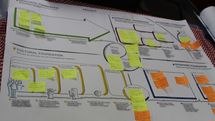

The Nature of Organising
In conventional usage, an organisation refers to any group of two or more people bound by common purpose or undertaking shared work together. We often use the word organisation to refer to the organising entity, regardless of size, scope or function. For example, a school, a business, a government, a community, etc. When seen as a verb, however, the act of organising is the neverending process and function of creating something or achieving something. It is the verb, the action, the second of these two definitions that we are most interested in.
Powerful Collaboration requires that we organise ourselves well, as individuals, teams and organisations. When we consider the act of organising, we often assign it the qualities of being systematic, efficient, orderly, maybe even controlled. However, if we look at the original definition of the verb organise taken from its Latin root organisare, “to arrange or form into a living being or organism”, we must also acknowledge qualities that are more organic, adaptive, even chaotic in nature.
Nature has an inherent self-organising pattern that has allowed life to flourish and adapt to different conditions over millennia, without any external control. When we look closer at this pattern we see that it has elements of both chaos and order co-existing harmoniously. Dee Hock, founder of the VISA card, named this the chaordic space; the state from which creativity, newness and growth emerges. It is also a pattern which we can consciously work with in our organisations.
Groundwork and the Nature of Organising
We work from the assumption that human organisations are living systems, not mechanistic systems, even though we sometimes treat them as if they were. The people that make up our organisations are not only capable of self-organising, taking leadership and collaborating to create extraordinary results, but in the process, they are capable of growing to become the best and strongest possible version of themselves. These ideas are not new, but we are beginning to see them in a variety of new forms, e.g. Holacracy, Open Space Technology, Teal Organisations and other so-called self-management systems.
Biologists exploring how living systems evolve have identified a number of preconditions that influence whether self-organisation can emerge within a system. We will come back to these later, but the important thing to understand now is that these conditions can be consciously cultivated and influenced. This is the work that we’re really interested in with Groundwork.
Groundwork is the practice of cultivating those conditions that enable powerful collaboration. Through practising Groundwork we can consciously create favourable conditions for self-organisation, and for other capacities we see as essential for collaborating powerfully, nurturing life, generating movement and innovating solutions in complex, adaptive systems like the ones we live and work in.
Naming this practice Groundwork connects it with the idea of organisations as living systems. It also draws inspiration from a quote by Otto Scharmer, who observes, “the quality of the field determines the quality of the yield”. When we work with organisations, Groundwork is the ongoing practice of cultivating the conditions (or creating the necessary foundations) which give rise to powerful collaboration. The fruits of that collaboration will be a direct result of the organisational conditions that the collaborators themselves created.
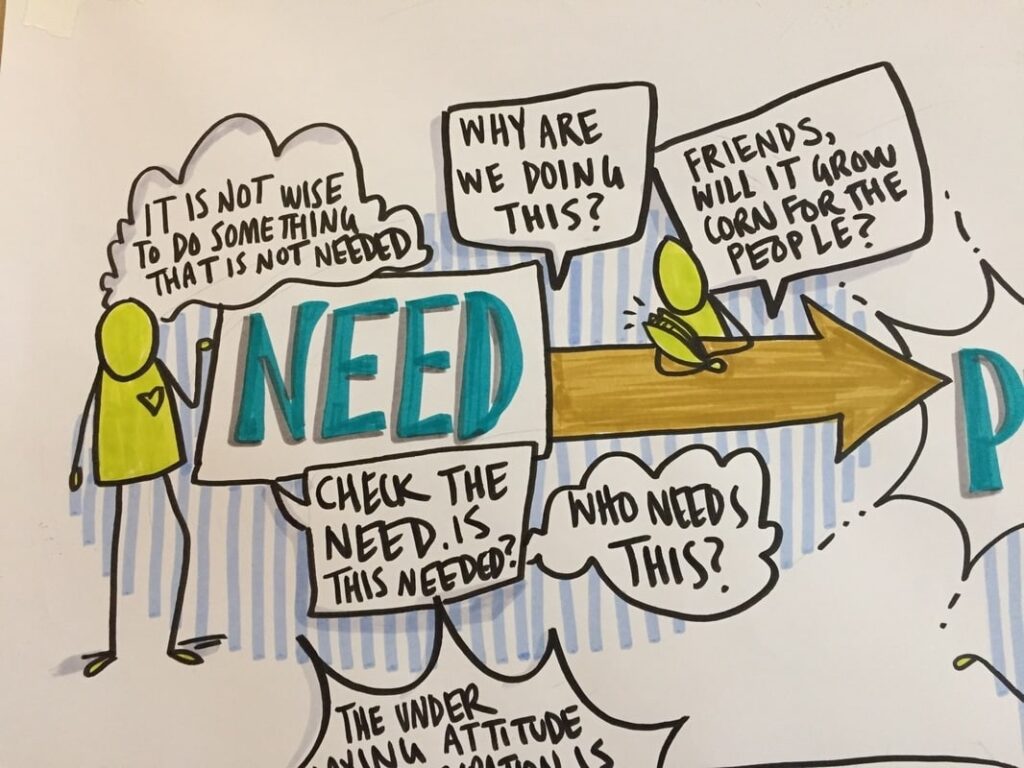
Visual by Bravespace
Groundwork and the Art of Hosting
Groundwork has emerged through the practice known as the Art of Hosting, widely acknowledged as an effective approach for working, collaborating, leading and learning in complex systems around issues that matter. The approach could be said to encompass three main components:
- Hosting conversations and work with a focus on dialogue methodology and process design;
- Harvesting the conversation/work, with a focus on learning, desired outcomes and strategy;
- Organising around the conversation/work, with focus on creating enabling structures
If we liken these three components to juggling balls that we aim to keep in constant motion as practitioners, Groundwork is the practice of creating a solid foundation for us to stand on as jugglers, and of cultivating the conditions that maximise our chances of juggling well. Ultimately these elements are all different aspects of one integrated practice. The Arts of Hosting, Harvesting and Organising are all key to practising good Groundwork, and Groundwork practice is integral to each of them in turn.
Given these links between Groundwork and the Art of Organising, it can be easy to confuse the two. Groundwork is about much more than getting really good at organising. It invites a focus on that which is less visible or that happens underground, below the surface. This includes the ongoing work of developing the self, the interior condition of each individual; it relates to the styles of leadership we practice, to the quality of interactions and relationships, to how we host and tend to the social field as a whole. Groundworking also relates to the clarifying of a shared vision, the ability to holding diverse perspectives together, and of continuously aligning individual and collective needs, long-term purpose and strategy.
By contrast, the Art of Organising is more practical, more tangible. It includes the operations, logistics, structures, systems, processes and so on that enable actions to be carried out which move the organisation closer to its goal. Together, the practical and organisational structures provide the basic foundations for collaboration. Just as the practices of hosting and harvesting are supported and strengthened by good organising, the practice of organising is underpinned by good Groundwork.
“Those who love peace must learn to organise as effectively as those who love war.”
Martin Luther King Jr.By referring to Groundwork and the Art of Organising, we hope to bring consciousness to the importance of organising while offering a shared language for how Groundwork and the arts of organising, hosting and harvesting fit together. The Groundwork model offers a map which shows the multi-layered depth of this practice.
While there are already a number of valuable resources focusing on the arts of hosting, harvesting and organising/convening, this training and guide is the first to explore the practice of Groundwork.
The (Re)defining of Groundwork
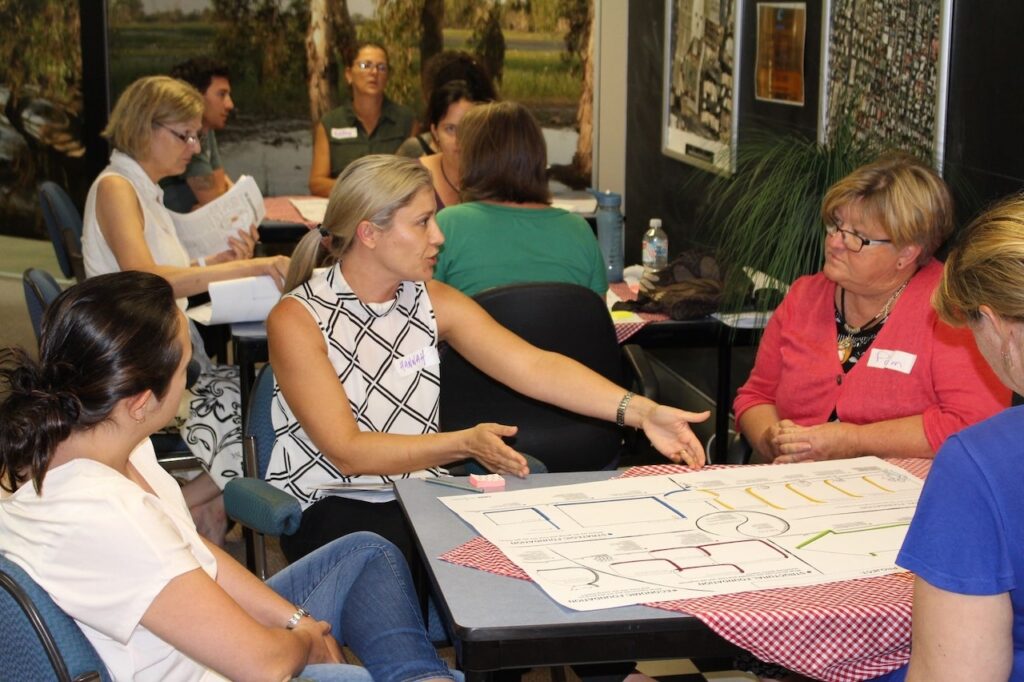
“Just as every good farmer focuses all his attention on sustaining and enhancing the quality of the soil, every good organisational leader focuses all her attention on sustaining and enhancing the quality of the social field that she is responsible for. For they know that the quality of the field determines the quality of the yield.”
Otto ScharmerWhat is the DNA of great organising and collaborating? We usually recognise it and appreciate it when we experience it but how often do we consciously plan for it or take the time to reflect on what it was that made it work so well?
It’s common sense that conscious preparation enhances performance but it’s often unclear what this means in an organisational context, particularly if we’re working within the realms of complexity and change.
Over the last 4-5 years we have been exploring these questions as part of our work around preparing the ground for effective organisation, powerful collaboration and meaningful results. It seems self-evident, but what we are learning is that building and maintaining solid foundations to support us and strengthen our shared work is absolutely fundamental. It’s not a box to be ticked and then move on. It’s an ongoing practice and we call it Groundwork.
Groundwork is applicable to groups, teams and organisations of any size and context, but it is also relevant for each of us as individuals. The importance of inner Groundwork is widely acknowledged these days given its impact on how we show up and work with others.
An awareness of these foundations and what they enable allows us to work more consciously with them to create conditions in which people feel they matter and belong, and through which meaningful results can manifest.
In the last 12 months, we have begun inviting others to share and explore Groundwork with us through workshops in Copenhagen, Brisbane and Halifax. These events have all generated considerable interest and excitement, as well as being really helpful and meaningful to people who attended.
These workshops offer a space for exploring Groundwork through a simple framework for organising and collaborating effectively. The framework consists of six foundations which apply to any collaborative endeavour.
THE FOUNDATIONS OF POWERFUL COLLABORATION
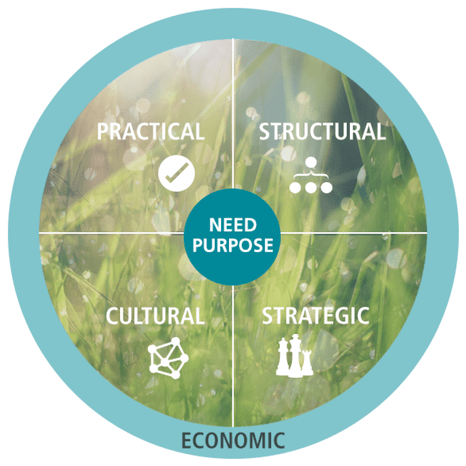
Need and Purpose Foundation
What is the current need that wants to be addressed?
What is the purpose (or future possibility) that we are working towards?Cultural Foundation
Who are we, and how are we working/being together?
Strategic Foundation
Where are we going and how will we get there?
Structural Foundation
What structures are needed and how will we organise ourselves within them?
Practical Foundation
What actions are required and how do we execute them skilfully?
Economic Foundation
What resources are we drawing on and how are we using them?
Working with this simple framework creates real value for teams, project managers, leaders, managers, social entrepreneurs and consultants who want to bring more clarity, alignment and meaning to their work. It includes exploring or clarifying mindsets, values and principles, as well as some of the practices, tools and resources that can support effective organising and powerful collaboration.
Participants (both individuals and teams) focus on an actual project – something they are currently or soon to be working on. The only criteria is that the project involves some form of collaboration, but let’s be honest, it’s hard to think of a project that doesn’t.
During the workshops participants get a fresh look at their project through the Groundwork perspective while receiving input, feedback and coaching on their work from peers. The beauty of these workshops is that they allow teams to focus on what is most relevant for supporting them and their project.
If you’re curious to learn more about Groundwork practice there is a Groundwork training coming up soon in Copenhagen from 8-10 June.
We’d love to hear your thoughts on this work and how we can make it even more relevant, applicable and accessible. And of course we’d be grateful if you would share it with anyone you know who might find it useful.


